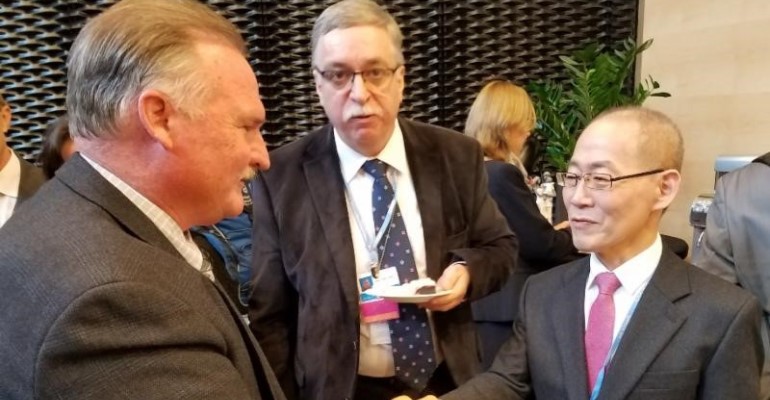Farmers’ voices heard at U.N. meeting on climate change in December.

The agriculture industry needs help -- and must help itself -- in taking on climate change, according to A.G. Kawamura, co-chair of Solutions from the Land and a member of the North America Climate Smart Agriculture Alliance (NACSAA).
Kawamura recently addressed delegates and observers in critical side events at global climate talks in Katowice, Poland, in mid-December at the 24th conference of Parties staged by the U.N. Framework Convention on Climate Change.
"The criticism of -- and the impatience with -- agriculture that seems to drive many discussions about how to address and adjust to changing climate patterns is a challenge for the sector. Yet, the sector's ability to feed a global population that has grown by 5.8 billion people in just under 100 years would indicate agriculture has been doing well,” Kawamura said.
He explained that agriculture and food systems are not broken; instead, “they are evolving and improving at an amazing pace with unbelievably important advances, and yet we need help, support and understanding today -- and certainly in the future. The U.N.'s Sustainable Development Goals cannot be achieved without agriculture functioning well and in a collaborative alignment with all stakeholders -- in other words, everybody who eats.”
Kawamura noted that NACSAA, other regional alliances and the Global Alliance for Climate Smart Agriculture (GACSA) are critically important in helping to educate, equip and mobilize all stakeholders in their pursuit of transformative change and adoption of climate-smart practices and thinking. NACSAA represents a diverse and dynamic cross-section of agriculture that is big and small, organic and conventional, business to subsistence.
Likewise, the climate regions in North America have extremes as well -- e.g., desert to tropical forest, below sea-level to mountains, hottest to coldest temperatures and most to least rainfall. The diversity of crops and crop systems is possibly more expansive and varied than any other region in the world. The need to support the role of farmers, ranchers and foresters as they struggle to adjust to changing climate, regulatory mandates, criticism from a misinformed public and misperceptions about what is happening today with agriculture is a priority for NACSAA and GACSA.
Kawamura urged all those who work the land and those who help producers grow and sell their goods to join the efforts of NACSAA and others that focus on climate-smart agriculture practices. “It is critical for all diverse stakeholders in the agriculture sector take an active role in the development of policy that aims to counter a changing climate," he said.
Also at the meeting, Fred Yoder, chairman of the NACSAA, met with Hoesung Lee, chairman of the International Panel on Climate Change (IPCC), to discuss the role of agriculture in delivering solutions to climate change and achieving the U.N. Sustainable Development Goals.
IPCC is the U.N. body that assesses the science related to climate change and is made up of representatives and experts of some 195 member countries. The panel develops its reports through the work of hundreds of scientists who volunteer to assess the research that is being developed around the world.
Yoder's conversation with Lee followed comments the NACSAA head made Monday during an opening session on the Koronivia Joint Work Program on Agriculture, a strategy being developed by global negotiators to incorporate innovative working lands practices in efforts to address climate change. Yoder thanked Lee for including agriculture in the efforts to address climate change.
Lee responded by affirming the critical role farmers, ranchers and forestland owners can play in stemming climate change.
A special report issued by IPCC in October said the rate of global greenhouse gas emissions is increasing to levels that will push temperatures above the limits targeted by world leaders in the 2015 Paris Climate Agreement. The panel reported that significant action must be taken -- and taken now -- to limit the increase in global temperature to no more than the midcentury target of 1.5°C above pre-industrial levels.
Without rapid, far-reaching and unprecedented changes in the energy, transportation and agriculture sectors, the risks of a changing climate to communities, regions and nations dramatically increase, IPPC said.
While the report details the challenges this world faces, it also offers opportunities to find innovative ways counter and stem the rising tide that is climate change.
Among other initiatives undertaken by Solutions from the Land, which launched NACSAA in 2015, is the promotion of the role of agriculture in taking on growing climate-related risks.
Among other strategies, NACSAA members promote the use of production and conservation practices -- cover crops, enhanced crop rotation, rotational grazing, and no- and low-till farming -- to capture carbon in soil. As a result, soil health and crop resilience are enhanced, and the amount of climate-warming carbon dioxide emitted into the atmosphere is lowered.
About the Author(s)
You May Also Like



.png?width=300&auto=webp&quality=80&disable=upscale)

